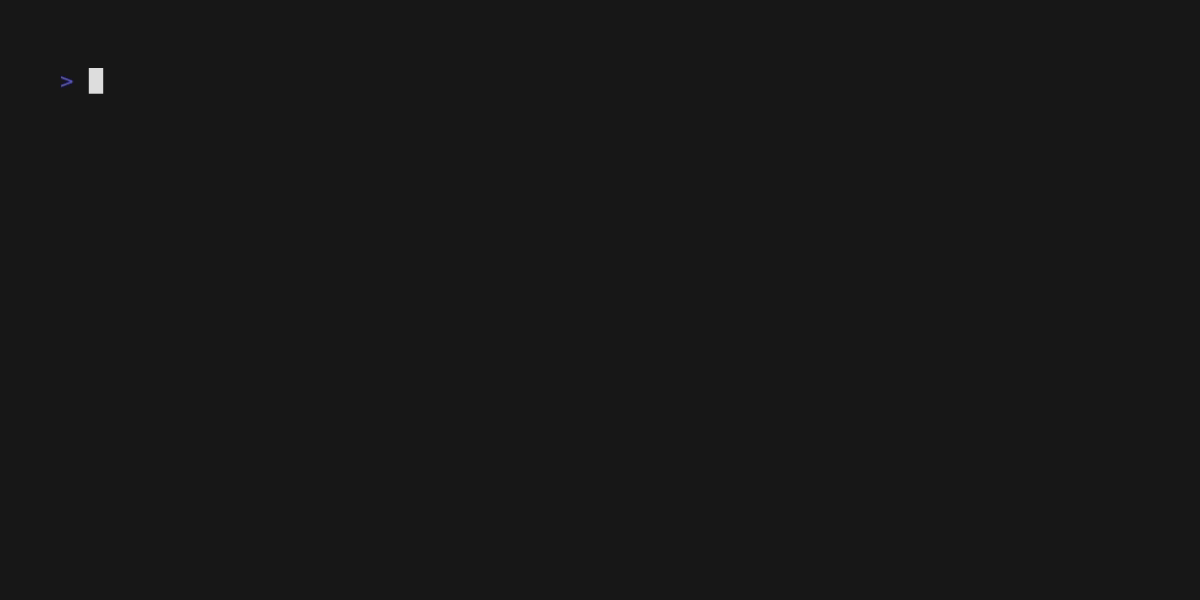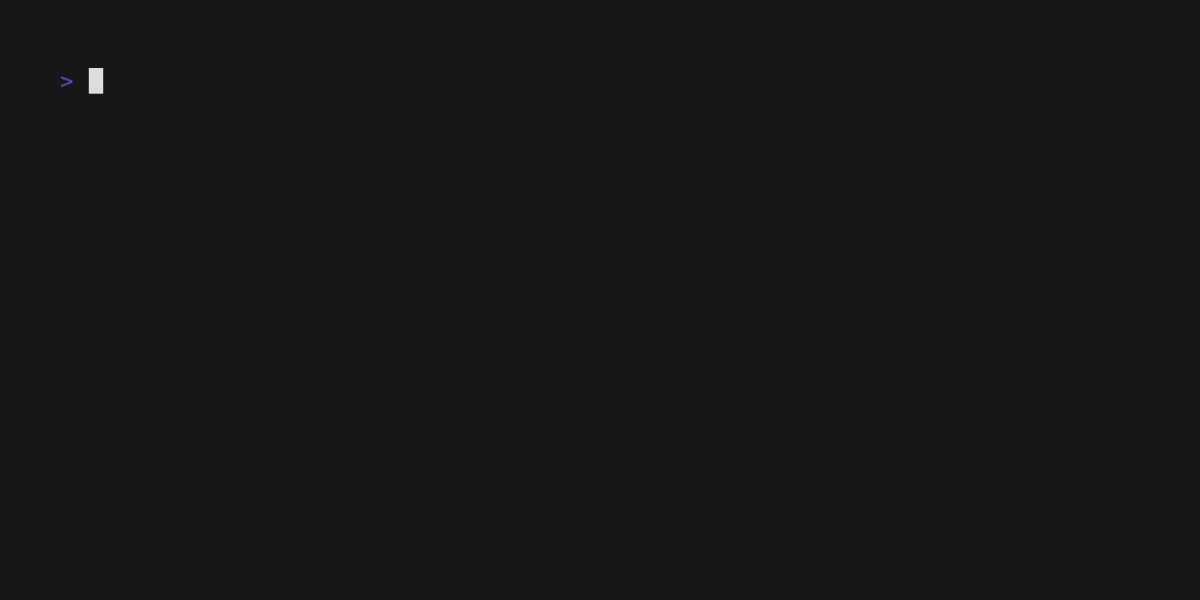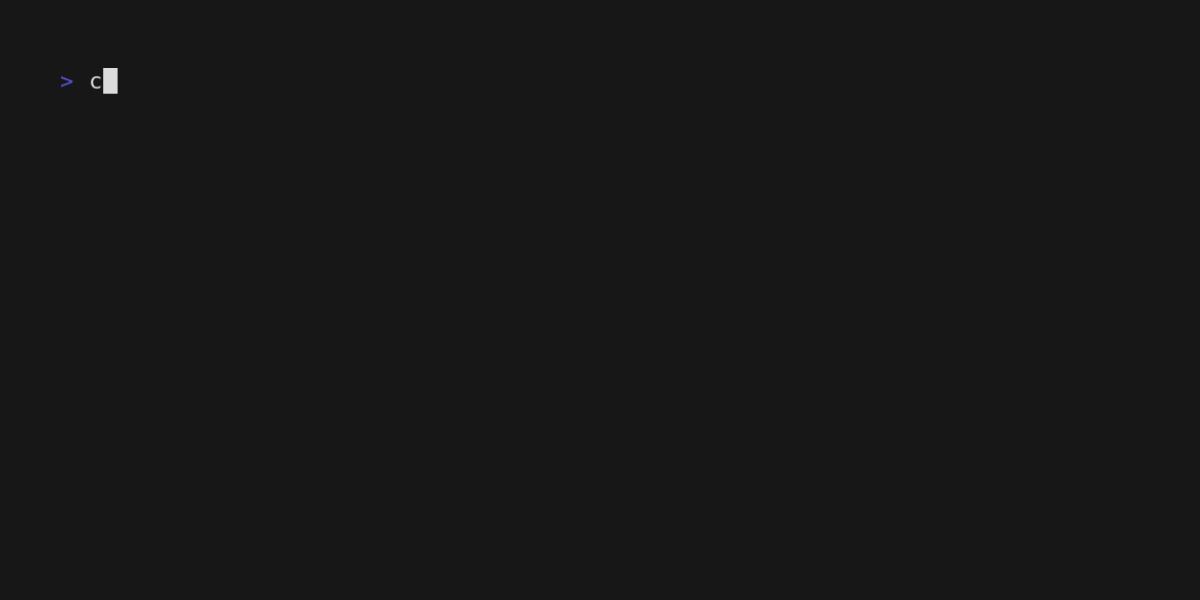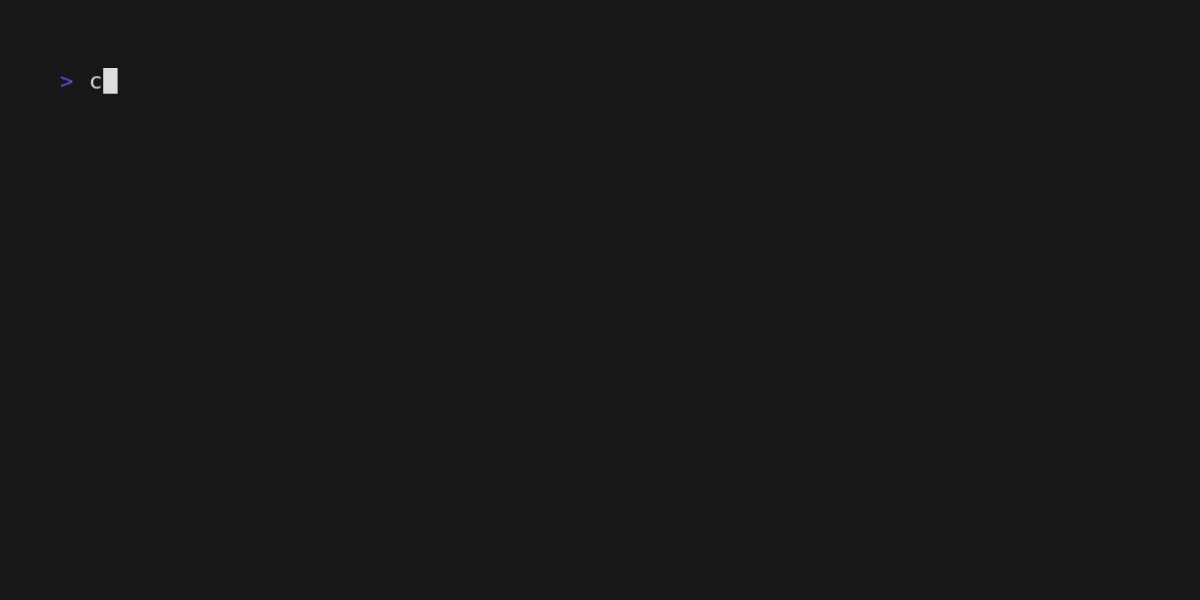Anjakan kod bangunan
Minggu ini, saya telah mengusahakan alat baris arahan yang saya namakan codeshift, yang membolehkan pengguna memasukkan fail kod sumber, memilih bahasa pengaturcaraan dan menterjemahkannya ke dalam bahasa pilihan mereka.

Tiada perkara mewah yang berlaku di bawah hud - ia hanya menggunakan penyedia AI yang dipanggil Groq untuk mengendalikan terjemahan - tetapi saya ingin masuk ke dalam proses pembangunan, cara ia digunakan dan ciri yang ditawarkannya.
 uday-rana
/
anjakan kod
uday-rana
/
anjakan kod
perubahan kod
Alat baris arahan yang mengubah fail kod sumber kepada mana-mana bahasa.

Ciri
- Menerima berbilang fail input
- Strim output ke stdout
- Boleh memilih bahasa output
- Boleh menentukan laluan fail untuk menulis output ke fail
- Boleh menggunakan kunci API tersuai dalam .env
Pemasangan
- Pasang Node.js
- Dapatkan kunci API Groq
- Klon repo dengan Git atau muat turun sebagai .zip
- Dalam direktori repo yang mengandungi package.json, jalankan pemasangan npm
- (Pilihan) Jalankan npm install -g . untuk memasang pakej secara global (untuk membolehkan anda menjalankannya tanpa awalan nod)
- Buat fail bernama .env dan tambah kunci API Groq anda: GROQ_API_KEY=API_KEY_HERE
Penggunaan
perubahan kod [-o
Contoh
codeshift -o index.go go examples/index.js

Pilihan
- -o, --output: Tentukan nama fail untuk menulis output kepada
- -h, --help: Paparkan bantuan untuk arahan
- -v, --version: Keluarkan nombor versi
Hujah
-
: Bahasa yang dikehendaki untuk menukar fail sumber kepada -
: Laluan…
Ciri-ciri
- Menerima berbilang fail input
- Boleh memilih bahasa output
- Strim output ke stdout
- Boleh menentukan laluan fail untuk menulis output ke fail
- Boleh menggunakan kunci API tersuai dalam .env
Penggunaan
perubahan kod [-o
Sebagai contoh, untuk menterjemah fail examples/index.js kepada Go dan simpan output ke index.go:
codeshift -o index.go go examples/index.js

Pilihan
- -o, --output: Tentukan nama fail untuk menulis output kepada
- -h, --help: Paparkan bantuan untuk arahan
- -v, --versi: Keluarkan nombor versi
Hujah
-
: Bahasa yang diingini untuk menukar fail sumber kepada -
: Laluan ke fail sumber, dipisahkan dengan ruang
Pembangunan
Saya telah mengusahakan projek ini sebagai sebahagian daripada kursus Topik dalam Pembangunan Sumber Terbuka di Politeknik Seneca di Toronto, Ontario. Bermula, saya mahu kekal dengan teknologi yang saya selesa, tetapi arahan untuk projek itu menggalakkan kami mempelajari sesuatu yang baharu, seperti bahasa pengaturcaraan baharu atau masa jalan baharu.
Walaupun saya ingin mempelajari Java, selepas melakukan beberapa penyelidikan dalam talian, nampaknya ia bukan pilihan yang bagus untuk membangunkan alat CLI atau antara muka dengan model AI. Ia tidak disokong secara rasmi oleh OpenAI dan pustaka komuniti yang ditampilkan dalam dokumen mereka tidak digunakan lagi.
Saya sentiasa menjadi orang yang berpegang kepada teknologi popular - mereka cenderung boleh dipercayai dan mempunyai dokumentasi lengkap serta banyak maklumat yang tersedia dalam talian. Tetapi kali ini, saya memutuskan untuk melakukan perkara yang berbeza. Saya memutuskan untuk menggunakan Bun, masa jalan baharu yang menarik untuk JavaScript yang bertujuan untuk menggantikan Node.
Ternyata saya sepatutnya terjebak dengan usus saya. Saya menghadapi masalah cuba menyusun projek saya dan apa yang boleh saya lakukan ialah berharap pembangun akan menyelesaikan isu tersebut.
 Tidak boleh menggunakan OpenAI SDK dengan ejen Sentry Node: TypeError: getDefaultAgent bukan fungsi
#1010
Tidak boleh menggunakan OpenAI SDK dengan ejen Sentry Node: TypeError: getDefaultAgent bukan fungsi
#1010

Sahkan ini ialah isu perpustakaan Node dan bukan isu API OpenAI yang mendasari
- [X] Ini ialah isu dengan pustaka Nod
Terangkan pepijat
Dirujuk sebelum ini di sini, ditutup tanpa penyelesaian: https://github.com/openai/openai-node/issues/903
Ini adalah isu yang agak besar kerana ia menghalang penggunaan SDK semasa menggunakan pakej pemantauan Sentry terkini.
Untuk Membiak
- Pasang Sentry Node sdk melalui npm i @sentry/node --save
- Masukkan kod berikut;
import * as Sentry from '@sentry/node';
// Start Sentry
Sentry.init({
dsn: "https://your-sentry-url",
environment: "your-env",
tracesSampleRate: 1.0, // Capture 100% of the transactions
});- Try to create a completion somewhere in the process after Sentry has been initialized:
const params = {
model: model,
stream: true,
stream_options: {
include_usage: true
},
messages
};
const completion = await openai.chat.completions.create(params);Results in error:
TypeError: getDefaultAgent is not a function
at OpenAI.buildRequest (file:///my-project/node_modules/openai/core.mjs:208:66)
at OpenAI.makeRequest (file:///my-project/node_modules/openai/core.mjs:279:44)
Code snippets
(Included)
OS
All operating systems (macOS, Linux)
Node version
v20.10.0
Library version
v4.56.0
This turned me away from Bun. I'd found out from our professor we were going to compile an executable later in the course, and I did not want to deal with Bun's problems down the line.
So, I switched to Node. It was painful going from Bun's easy-to-use built-in APIs to having to learn how to use commander for Node. But at least it wouldn't crash.
I had previous experience working with AI models through code thanks to my co-op, but I was unfamiliar with creating a command-line tool. Configuring the options and arguments turned out to be the most time-consuming aspect of the project.
Apart from the core feature we chose for each of our projects - mine being code translation - we were asked to implement any two additional features. One of the features I chose to implement was to save output to a specified file. Currently, I'm not sure this feature is that useful, since you could just redirect the output to a file, but in the future I want to use it to extract the code from the response to the file, and include the AI's rationale behind the translation in the full response to stdout. Writing this feature also helped me learn about global and command-based options using commander.js. Since there was only one command (run) and it was the default, I wanted the option to show up in the default help menu, not when you specifically typed codeshift help run, so I had to learn to implement it as a global option.
I also ended up "accidentally" implementing the feature for streaming the response to stdout. I was at first scared away from streaming, because it sounded too difficult. But later, when I was trying to read the input files, I figured reading large files in chunks would be more efficient. I realized I'd already implemented streaming in my previous C++ courses, and figuring it wouldn't be too bad, I got to work.
Then, halfway through my implementation I realized I'd have to send the whole file at once to the AI regardless.
But this encouraged me to try streaming the output from the AI. So I hopped on MDN and started reading about ReadableStreams and messing around with ReadableStreamDefaultReader.read() for what felt like an hour - only to scroll down the AI provider's documentation and realize all I had to do was add stream: true to my request.
Either way, I may have taken the scenic route but I ended up implementing streaming.
Planned Features
Right now, the program parses each source file individually, with no shared context. So if a file references another, it wouldn't be reflected in the output. I'd like to enable it to have that context eventually. Like I mentioned, another feature I want to add is writing the AI's reasoning behind the translation to stdout but leaving it out of the output file. I'd also like to add some of the other optional features, like options to specify the AI model to use, the API key to use, and reading that data from a .env file in the same directory.
That's about it for this post. I'll be writing more in the coming weeks.
Atas ialah kandungan terperinci Anjakan kod bangunan. Untuk maklumat lanjut, sila ikut artikel berkaitan lain di laman web China PHP!

Alat AI Hot

Undresser.AI Undress
Apl berkuasa AI untuk mencipta foto bogel yang realistik

AI Clothes Remover
Alat AI dalam talian untuk mengeluarkan pakaian daripada foto.

Undress AI Tool
Gambar buka pakaian secara percuma

Clothoff.io
Penyingkiran pakaian AI

Video Face Swap
Tukar muka dalam mana-mana video dengan mudah menggunakan alat tukar muka AI percuma kami!

Artikel Panas

Alat panas

Notepad++7.3.1
Editor kod yang mudah digunakan dan percuma

SublimeText3 versi Cina
Versi Cina, sangat mudah digunakan

Hantar Studio 13.0.1
Persekitaran pembangunan bersepadu PHP yang berkuasa

Dreamweaver CS6
Alat pembangunan web visual

SublimeText3 versi Mac
Perisian penyuntingan kod peringkat Tuhan (SublimeText3)

Topik panas
 1668
1668
 14
14
 1427
1427
 52
52
 1329
1329
 25
25
 1273
1273
 29
29
 1256
1256
 24
24
 Enjin JavaScript: Membandingkan Pelaksanaan
Apr 13, 2025 am 12:05 AM
Enjin JavaScript: Membandingkan Pelaksanaan
Apr 13, 2025 am 12:05 AM
Enjin JavaScript yang berbeza mempunyai kesan yang berbeza apabila menguraikan dan melaksanakan kod JavaScript, kerana prinsip pelaksanaan dan strategi pengoptimuman setiap enjin berbeza. 1. Analisis leksikal: Menukar kod sumber ke dalam unit leksikal. 2. Analisis Tatabahasa: Menjana pokok sintaks abstrak. 3. Pengoptimuman dan Penyusunan: Menjana kod mesin melalui pengkompil JIT. 4. Jalankan: Jalankan kod mesin. Enjin V8 mengoptimumkan melalui kompilasi segera dan kelas tersembunyi, Spidermonkey menggunakan sistem kesimpulan jenis, menghasilkan prestasi prestasi yang berbeza pada kod yang sama.
 Python vs JavaScript: Keluk Pembelajaran dan Kemudahan Penggunaan
Apr 16, 2025 am 12:12 AM
Python vs JavaScript: Keluk Pembelajaran dan Kemudahan Penggunaan
Apr 16, 2025 am 12:12 AM
Python lebih sesuai untuk pemula, dengan lengkung pembelajaran yang lancar dan sintaks ringkas; JavaScript sesuai untuk pembangunan front-end, dengan lengkung pembelajaran yang curam dan sintaks yang fleksibel. 1. Sintaks Python adalah intuitif dan sesuai untuk sains data dan pembangunan back-end. 2. JavaScript adalah fleksibel dan digunakan secara meluas dalam pengaturcaraan depan dan pelayan.
 Dari C/C ke JavaScript: Bagaimana semuanya berfungsi
Apr 14, 2025 am 12:05 AM
Dari C/C ke JavaScript: Bagaimana semuanya berfungsi
Apr 14, 2025 am 12:05 AM
Peralihan dari C/C ke JavaScript memerlukan menyesuaikan diri dengan menaip dinamik, pengumpulan sampah dan pengaturcaraan asynchronous. 1) C/C adalah bahasa yang ditaip secara statik yang memerlukan pengurusan memori manual, manakala JavaScript ditaip secara dinamik dan pengumpulan sampah diproses secara automatik. 2) C/C perlu dikumpulkan ke dalam kod mesin, manakala JavaScript adalah bahasa yang ditafsirkan. 3) JavaScript memperkenalkan konsep seperti penutupan, rantaian prototaip dan janji, yang meningkatkan keupayaan pengaturcaraan fleksibiliti dan asynchronous.
 JavaScript dan Web: Fungsi teras dan kes penggunaan
Apr 18, 2025 am 12:19 AM
JavaScript dan Web: Fungsi teras dan kes penggunaan
Apr 18, 2025 am 12:19 AM
Penggunaan utama JavaScript dalam pembangunan web termasuk interaksi klien, pengesahan bentuk dan komunikasi tak segerak. 1) kemas kini kandungan dinamik dan interaksi pengguna melalui operasi DOM; 2) pengesahan pelanggan dijalankan sebelum pengguna mengemukakan data untuk meningkatkan pengalaman pengguna; 3) Komunikasi yang tidak bersesuaian dengan pelayan dicapai melalui teknologi Ajax.
 JavaScript in Action: Contoh dan projek dunia nyata
Apr 19, 2025 am 12:13 AM
JavaScript in Action: Contoh dan projek dunia nyata
Apr 19, 2025 am 12:13 AM
Aplikasi JavaScript di dunia nyata termasuk pembangunan depan dan back-end. 1) Memaparkan aplikasi front-end dengan membina aplikasi senarai TODO, yang melibatkan operasi DOM dan pemprosesan acara. 2) Membina Restfulapi melalui Node.js dan menyatakan untuk menunjukkan aplikasi back-end.
 Memahami Enjin JavaScript: Butiran Pelaksanaan
Apr 17, 2025 am 12:05 AM
Memahami Enjin JavaScript: Butiran Pelaksanaan
Apr 17, 2025 am 12:05 AM
Memahami bagaimana enjin JavaScript berfungsi secara dalaman adalah penting kepada pemaju kerana ia membantu menulis kod yang lebih cekap dan memahami kesesakan prestasi dan strategi pengoptimuman. 1) aliran kerja enjin termasuk tiga peringkat: parsing, penyusun dan pelaksanaan; 2) Semasa proses pelaksanaan, enjin akan melakukan pengoptimuman dinamik, seperti cache dalam talian dan kelas tersembunyi; 3) Amalan terbaik termasuk mengelakkan pembolehubah global, mengoptimumkan gelung, menggunakan const dan membiarkan, dan mengelakkan penggunaan penutupan yang berlebihan.
 Python vs JavaScript: Komuniti, Perpustakaan, dan Sumber
Apr 15, 2025 am 12:16 AM
Python vs JavaScript: Komuniti, Perpustakaan, dan Sumber
Apr 15, 2025 am 12:16 AM
Python dan JavaScript mempunyai kelebihan dan kekurangan mereka sendiri dari segi komuniti, perpustakaan dan sumber. 1) Komuniti Python mesra dan sesuai untuk pemula, tetapi sumber pembangunan depan tidak kaya dengan JavaScript. 2) Python berkuasa dalam bidang sains data dan perpustakaan pembelajaran mesin, sementara JavaScript lebih baik dalam perpustakaan pembangunan dan kerangka pembangunan depan. 3) Kedua -duanya mempunyai sumber pembelajaran yang kaya, tetapi Python sesuai untuk memulakan dengan dokumen rasmi, sementara JavaScript lebih baik dengan MDNWebDocs. Pilihan harus berdasarkan keperluan projek dan kepentingan peribadi.
 Python vs JavaScript: Persekitaran dan Alat Pembangunan
Apr 26, 2025 am 12:09 AM
Python vs JavaScript: Persekitaran dan Alat Pembangunan
Apr 26, 2025 am 12:09 AM
Kedua -dua pilihan Python dan JavaScript dalam persekitaran pembangunan adalah penting. 1) Persekitaran pembangunan Python termasuk Pycharm, Jupyternotebook dan Anaconda, yang sesuai untuk sains data dan prototaip cepat. 2) Persekitaran pembangunan JavaScript termasuk node.js, vscode dan webpack, yang sesuai untuk pembangunan front-end dan back-end. Memilih alat yang betul mengikut keperluan projek dapat meningkatkan kecekapan pembangunan dan kadar kejayaan projek.




 uday-rana
/
anjakan kod
uday-rana
/
anjakan kod
 Tidak boleh menggunakan OpenAI SDK dengan ejen Sentry Node: TypeError: getDefaultAgent bukan fungsi
#1010
Tidak boleh menggunakan OpenAI SDK dengan ejen Sentry Node: TypeError: getDefaultAgent bukan fungsi
#1010
